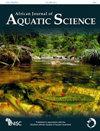南非东开普省河口圆鲱(Gilchristella aestuaria)(双鱼:圆鲱科)的宏观和微量营养素组成:必需营养素的潜在膳食来源
IF 1
4区 环境科学与生态学
Q3 MARINE & FRESHWATER BIOLOGY
引用次数: 0
摘要
南非缺乏对贫困农村社区可获得的内陆小型鱼类的营养价值的研究,尽管这些物种有可能缓解微量营养素缺乏症。在这里,我们首次对河口圆鲱Gilchristella aestuaria进行了营养成分分析,这是一种分布广泛的小型鱼类,在许多河口和淡水栖息地都很丰富。分析了五个河口和两个淡水生境中灰蝶的蛋白质、脂肪、钙、铁、锌和维生素A含量。我们发现河口和淡水栖息地的营养素含量没有差异,每种营养素的水平与温度、浊度、pH、叶绿素a、磷酸盐、硝酸盐和氨的变化之间也没有显著相关性(Spearman检验)。与其他国家食用的其他小型鱼类相比,aestuaria的铁、锌、钙、脂肪和蛋白质含量相当,但维生素A含量非常低。当考虑到两岁或两岁以上婴儿、成年男性和女性以及孕妇和哺乳期妇女的推荐饮食量时,我们发现aestuaria是除维生素A外所有这些营养素的良好来源。本文章由计算机程序翻译,如有差异,请以英文原文为准。
Macro- and micronutrient composition of estuarine roundherring (Gilchristella aestuaria) (Pisces: Clupeidae) in the Eastern Cape, South Africa: a potential dietary source of essential nutrients
South Africa lacks research on the nutritional value of inland small fish species available to poor rural communities, despite the potential of such species to mitigate micronutrient deficiencies. Here we provide the first nutrient composition analysis for estuarine roundherring Gilchristella aestuaria, a widespread small fish species that is abundant in many estuarine and freshwater habitats. Protein, fat, calcium, iron, zinc and vitamin A content of G. aestuaria from five estuarine and two freshwater habitats were analysed. We found no difference in nutrient content between estuarine and freshwater habitats, and no significant correlation (Spearman’s test) between levels of each nutrient and variation in temperature, turbidity, pH, chlorophyll a, phosphates, nitrates and ammonia. Compared with other small fish species consumed in other countries, G. aestuaria has comparable iron, zinc, calcium, fat and protein, but very low levels of vitamin A. When considering the recommended dietary allowance of infants aged two or more, adult men and women, and pregnant and lactating women, we found that G. aestuaria is an excellent source of all these nutrients, except vitamin A.
求助全文
通过发布文献求助,成功后即可免费获取论文全文。
去求助
来源期刊

African Journal of Aquatic Science
MARINE & FRESHWATER BIOLOGY-
CiteScore
3.90
自引率
7.10%
发文量
31
审稿时长
>12 weeks
期刊介绍:
The African Journal of Aquatic Science is an international journal devoted to the study of the aquatic sciences, covering all African inland and estuarine waters. The Journal publishes peer-reviewed original scientific papers and short articles in all the aquatic science fields including limnology, hydrobiology, ecology, conservation, biomonitoring, management, water quality, ecotoxicology, biological interactions, physical properties and human impacts on African aquatic systems.
 求助内容:
求助内容: 应助结果提醒方式:
应助结果提醒方式:


